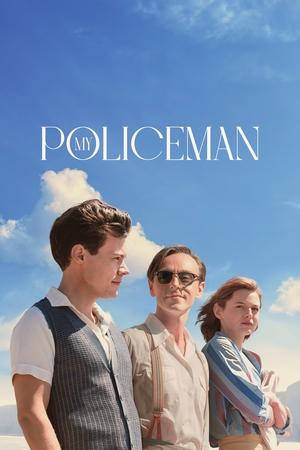
My Policeman
I was rather nervous about seeing this film. After his lacklustre "debut" in "Don't Worry Darling" I feared that Harry Styles was just going to turn up, smile, get naked, and that would be that. Well, to be fair, we have quite a bit more here in this engaging drama. David Dawson is also quite effective as art gallery curator "Patrick" who takes a bit of a shine to policeman "Tom" (Styles) after a cycle incident. The latter shows some interest in art and agrees to be drawn (in full constable's uniform). Nervous, "Patrick" gives his visitor some Scotch and well, you can imagine the rest. The thing is, of course, the UK in the 1950s was still pretty homophobic, and their behaviour must be clandestine to say the least. Simultaneously, "Tom" is trying to conform with a relationship with, and marriage to, "Marion" (Emma Corrin) but gradually she becomes aware that Princess Diana wasn't the only person to have three people in her marriage. Reported, somehow, to the authorities, "Patrick" faces ruin and violent imprisonment. This historical story is set within a rather less interesting template of modern day life, with the recently stroke-affected "Patrick" (a strong, if largely dialogue-free, effort from Rupert Everett) coming to live with the now going-through-the-motions "Marion" (Gina McKee) - whose reading of the invalid man's diaries provides us with the basis for the retrospective - and "Tom" (Linus Roache) and this rather downbeat scenario rather robs the film of any jeopardy and also drags the pace down into something akin to the soporific. Styles is not yet a very good actor. His frequent kissing scenes are quite clumsy to watch and he speaks in a sort of clipped manner suggesting the elocution people have got at him, but there is still something natural about his performance here. He gels well with the accomplished theatre actor Dawson, and the increasingly disaffected "Marion" is well portrayed by Corrin - all delivering a script that does enough to set the scene. It's a stylish production. Amazon have clearly thrown some money at it and combined with a pleasing score from Steven Price this presents us with a better than expected love story with just enough political sense to alert us to the difficulties faced by gay men as recently as 1957. Styles' participation in this movie is bound to raise the profile of the persecution culture that existed then, and still exists in many nations around the world now - and for that he also ought to be commended. It's a solid film, not a great one - but it is certainly worth a gander.
